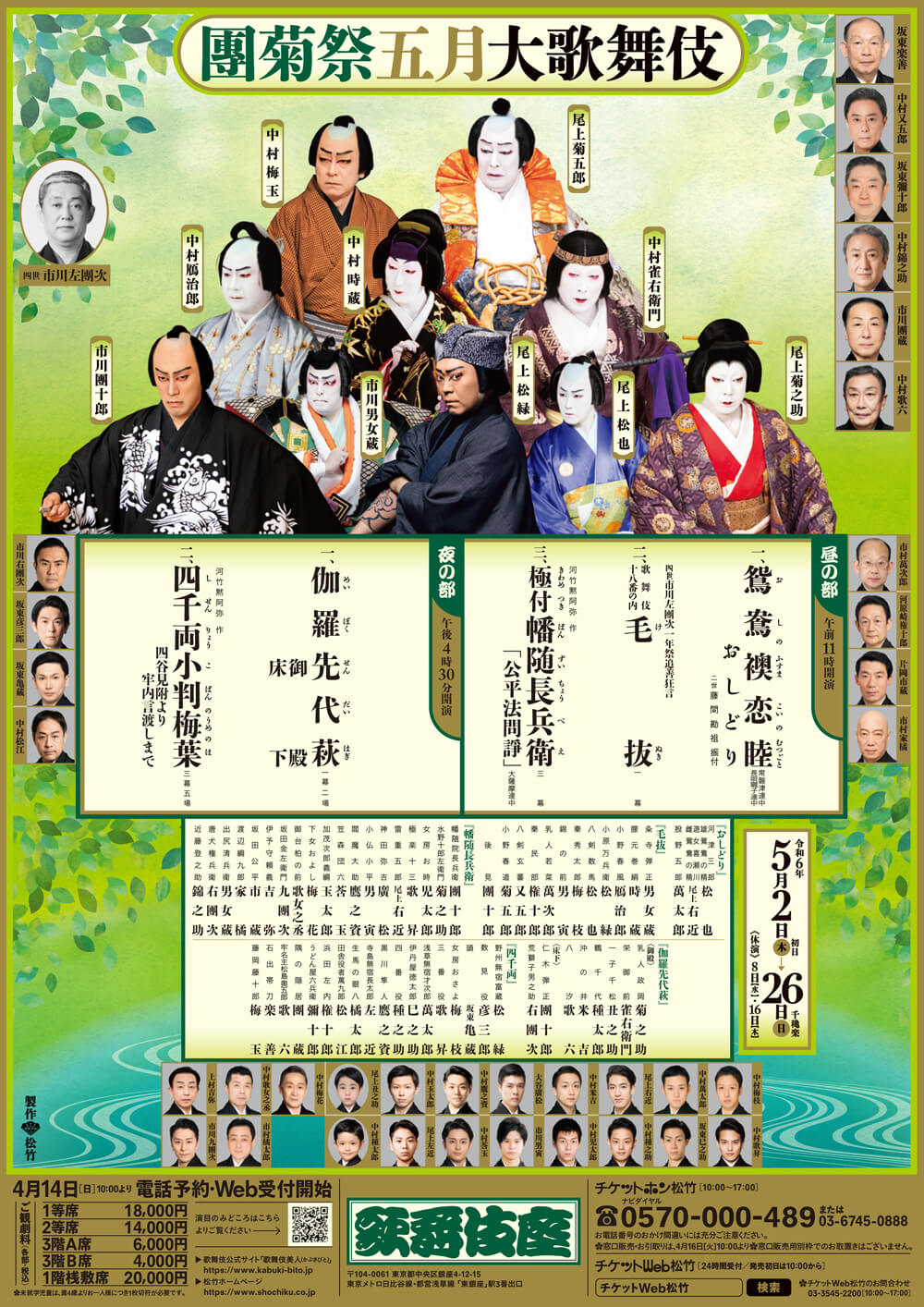Kabukiza Theatre
May Program at the Kabukiza Theatre
Daily: May 02 (Thu) - May 26 (Sun), 2024
Matinee:11:00 AM
Evening Show: 4:30 PM
*No performances on the 8th (Wed) and 16th (Thu).
[Important Notice]
(Updated)Notification of the absence and cast replacement of Nakamura Karoku for the Evening show May performances(May 25)
On sale: from Apr 14 (Sun), 2024 10:00 AM(JST)
First Class Seat: 18,000
Second Class Seat: 14,000
Upper Tier A: 6,000
Upper Tier B: 4,000
Unit: Japanese Yen (tax included)
*Box Seat: 20,000 (Not available online. Click here for details.)
*Children over the age of 4 must purchase tickets to enter.
*Tea will not be offered at the Box Seats.
Kabukiza Theatre (at TOKYO) Theatre Information
- Single Act Tickets
- *Online Single Act Tickets will go on sale from the day before the performance date at 12:00PM (noon).
*Tickets for dates shown as "Sold Out" or for other preferred seating areas, may still be available from the promoter, Shochiku Co., Ltd. Please confirm the availability by phone or stop by the Box Office.
*Simplified English Audio Guide available (1,000 yen, cash only; brief description and synopsis only).
*Free English flyer/Sold program (Detailed English synopses are found at the end of the Japanese program) available.
The May program at the Kabukiza Theatre features the annual 'Dan-Kiku Sai' (the 'Dan-Kiku Festival'). This was first held in April and May, 1936, at the Kabukiza Theatre in honor of the actors Ichikawa Danjūrō IX and Onoe Kikugorō V who were active in the Meiji period and who lay the foundation of modern kabuki. The 'Dan-Kiku Festival' has been an annual festive event at the Kabukiza Theatre since 1977. Plays and dances associated with both acting families are included in the 'Dan-Kiku Festival' production, and this year to commemorate the first anniversary of the death of Ichikawa Sadanji IV, 'KENUKI' will be staged.
 Kabukiza Theatre Stage Photo
Kabukiza Theatre Stage Photo
OSHI NO FUSUMA KOI NO MUTSUGOTO
Oshidori
['Sumō' and 'Mandarin Ducks']
CAST :
- Kawazu no Saburō / The spirit of a male mandarin duck
- Onoe Matsuya
- Kisegawa, a courtesan / The spirit of a female mandarin duck
- Onoe Ukon
- Matano no Gorō
- Nakamura Mantarō
STORY :
Matano no Gorō, who loses to Kawazu no Saburō in a sumō match, gives up the courtesan Kisegawa to Kawazu as promised. However, the spiteful Matano plots to have Kawazu drink the blood of a male mandarin duck, a bird that is believed to have strong attachment to its partner, in order to disturb his mind and kill him. The spirit of a female mandarin duck appears whose partner was killed by Matano, as does the spirit of the male mandarin duck in the figure of Kawazu. The pair torments Matano mercilessly, venting the deep resentment they bear towards him, until finally they fly away.
Intermission: 35 minutes
KENUKI
['The Whisker Tweezers']
CAST :
- Kumedera Danjō
- Ichikawa Omezō
- Makiginu, a lady-in-waiting
- Nakamura Tokizō
- Ono no Harukaze
- Nakamura Ganjirō
- Ohara no Manbē
- Onoe Shōroku
- Yatsurugi Kazuma
- Onoe Matsuya
- Hata Hidetarō
- Nakamura Baishi
- Nishiki no mae
- Ichikawa Otora
- Wakana
- Ichimura Manjirō
- Hata Minbu
- Kawarasaki Gonjūrō
- Yatsurugi Genba
- Nakamura Matagorō
- Ono no Harumichi
- Onoe Kikugorō
- Stage assistant
- Ichikawa Danjūrō
STORY :
A princess has a mysterious ailment that makes her hair stand on end, and this prevents her from going ahead with her long-awaited marriage. Kumedera Danjō comes from the groom's household to investigate and, when his tweezers mysteriously float up in mid-air, he discovers a secret plot. This is one of 'The Eighteen Favorite Kabuki Plays'. This collection mostly features plays with the bombastic 'aragoto' style of acting, but ''Kenuki'' is an urbane, witty detective story that unfolds in a world of fantasy. It displays the spirit of early kabuki.
Intermission: 25 minutes
KIWAMETSUKI BANZUI CHŌBĒ
Kinpira Hōmon Arasoi
['The Renowned Banzui Chōbē' with the play-within-a-play 'Kinpira's Debate on Buddhism']
CAST :
- Banzui'in Chōbē
- Ichikawa Danjūrō
- Mizuno Jūrōzaemon
- Onoe Kikunosuke
- Otoki, Chōbē's wife
- Nakamura Kotarō
- Detchiri Seibē
- Ichikawa Omezō
- Tōken Gonbē
- Ichikawa Udanji
- Kondō Noborinosuke
- Nakamura Kinnosuke
STORY :
In the early Edo period, gallant men like Banzui'in Chōbē were leaders among the ordinary townspeople. But this incurred the wrath of members of the samurai class who were theoretically in control. As the play begins, a fight breaks out inside a theatre which is settled by Chōbē, but Chōbē's skillful arbitration frustrates the samurai Mizuno. A short time later, Mizuno invites Chōbē to visit his mansion. All of Chōbē's men tell him not to go because it is a trap, but Chōbē decides to meet his end and bids farewell to his wife and son.
MEIBOKU SENDAIHAGI
['Precious Incense and the Bush-clover of Sendai']
CAST :
- Masaoka, the wet-nurse
- Onoe Kikunosuke
- Sakae Gozen
- Nakamura Jakuemon
- Okinoi
- Nakamura Yonekichi
- Yashio, a lady-in-waiting
- Nakamura Karoku
- Nikki Danjō
- Ichikawa Danjūrō
- Arajishi Otokonosuke
- Ichikawa Udanji
<Goten>
<Yukashita>
STORY :
This is a 'jidaimono', a history play set in pre-modern Japan, but it is based on the attempt to take over one of the most famous samurai households in the Edo Period, a scandal that caused a sensation in its day. Young Tsuruchiyo is made heir after the lord of the Ashikaga House is forced into retirement because of his profligate ways. Masaoka, the young boy's wet-nurse, is afraid that he will be assassinated and refuses all male contact, insisting on making all his meals herself. In an attempt to kill Tsuruchiyo, the villains send a gift of poisoned cakes, and Masaoka only manages to protect the boy by sacrificing her own son. The loyal retainer Otokonosuke who has been on guard beneath the apartments, finds a suspicious rat, but fails to capture it. This is actually Nikki Danjō, the arch villain of the play, who used sorcery to disguise himself as a rat. With his magic powers, he suddenly disappears.
Intermission: 35 minutes
SHISENRYŌ KOBAN NO UMENOHA
['Four Thousand Gold Coins']
CAST :
- Tomizō, a vagabond from Shimotsuke Province
- Onoe Shōroku
- Prisoner of accountant
- Bandō Hikosaburō
- Chief Prisoner
- Bandō Kamezō
- Osayo, Tomizō's wife
- Nakamura Baishi
- Saijirō, a vagabond from Asakusa
- Nakamura Mantarō
- Itamiya Tokutarō
- Bandō Minosuke
- Hamada Sanai
- Kawarasaki Gonjūrō
- Rokubē, an udon seller
- Bandō Yajūrō
- Old Prisoner in the corner
- Ichikawa Danzō
- Matsushima Okugorō, Headman of the Prisoners
- Nakamura Karoku
- Fujioka Tōjūrō
- Nakamura Baigyoku
STORY :
This is a 'sewamono' play, a work portraying in a realistic way the lives of ordinary people in the Edo period. Written by Kawatake Mokuami, this play caused a sensation in its day for its realistic depiction of an Edo period jail. The plot is loosely based on a true incident: two men, one a masterless samurai, and the other a seasoned thief, break into the shogunate treasury and steal the immense sum of four thousand gold coins. Though the samurai tries to use the money to start a loan business and lead a normal life, the other wastes his share gambling. He finally resorts to extorting money from his former partner. The enormity of their crime makes it impossible to keep it secret and they are soon caught.


